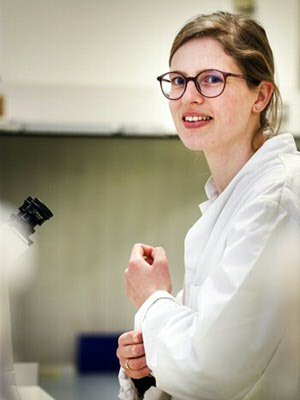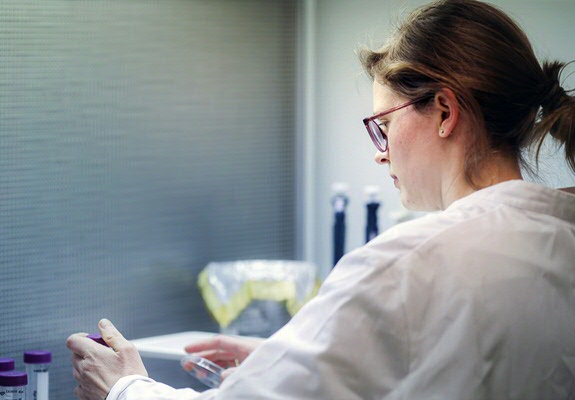Facing up to Parkinson’s disease: is there any hope of a cure?

PhD student Laura Nederveen is conducting research into Parkinson’s disease at the University of Groningen (UG). She is focusing on identifying causes of the disease, rather than on ways of implementing her knowledge. At least, until her uncle developed Parkinson’s.
By: Laura Nederveen. Photos: Henk Veenstra
Not long ago, my uncle was diagnosed with Parkinson’s disease, the second most common neurodegenerative disease after Alzheimer’s disease. It has turned his life upside down. He had just become a granddad, but the future suddenly felt a lot less bright. ‘How far is your research?’, my parents asked on hearing the news. I work in a laboratory and am studying Parkinson’s disease. They looked at me, their eyes full of hope. ‘Oh, er...’ I stammered, ‘research is a long, slow process.’ Researchers have been studying Parkinson’s disease for years, but as yet, they have not discovered any drugs that will halt or cure the disease. Moreover, my own results were nowhere near ready.
From fundamental research to medicine
At the same time, I realized that quite a lot of progress has actually been made in my research field. The more we learn about the disease, the easier it will be to start looking for new drugs. My work focuses on the most basic knowledge rather than the follow-up steps. But I suddenly saw my research in an entirely different perspective: will all this knowledge that we are accumulating actually lead to an effective drug? How does my research project fit into this? And most of all: is there any hope of a cure? I decided to climb down from my ivory tower and look for some answers.
What is Parkinson’s disease?
In the Netherlands, Parkinson’s disease affects approximately one percent of all people over the age of 60. The disease causes the neurons in a central part of the brain to gradually die off. This can go unnoticed for quite some time, until the remaining brain cells are no longer able to compensate. The diagnosis is not usually made until only 30% of the neurons in that part of the brain are left. As a result, my uncle’s symptoms include stiffness, tremors and problems with moving, which seriously impairs his day-to-day life. He will soon start taking drugs to deal with the symptoms, but they will not prevent more neurons from dying and they will eventually stop working. So we need to find new medicines that will slow down, reverse or even prevent this degeneration.

Misshapen protein
I am contributing to this, albeit indirectly. For my PhD research project, I am studying the effect of one specific protein that is involved in Parkinson’s disease. This protein is called LRRK2 (pronounced: Lark two) and in some patients, it is misshapen due to a genetic fault. In addition, this protein is more active in nearly all people with Parkinson’s disease than it is in healthy people: there is a particular chemical reaction that it performs too often. This is why in our lab, we are focusing on finding new ways to inhibit LRRK2 activity. But before we can do that, we need to understand how LRRK2 works. My research project involves studying how the body normally stabilizes LRRK2 activity.
Transplanting brain cells…..
So what is the current state of play regarding research into Parkinson’s disease? Until now, despite billions of euros having been invested, it is proving difficult to find drugs that will halt or slow down the disease process. I have, however, seen a few studies that are testing potential medicines in human trials. A logical remedy for brain cells dying off would be to transplant healthy cells to replace them. Several research groups are carrying out experiments in this vein. The therapy sometimes seems to help, but there is a risk of the new brain cells gradually dying off too, particularly if the disease is not only caused by the brain cells themselves, but also by the immune system.
… or stimulating them
Instead of a transplant, you could stimulate the remaining brain cells to grow. I recently watched a documentary about this, with the promising title ‘Looking for a drug for Parkinson’s disease’. The drug being investigated was GDNF, which is thought to stimulate the growth and recovery of neurons. It seems to be having a very beneficial effect on some patients. But it will be years before GDNF reaches the market. In addition, a serious medical procedure is needed to inject GDNF into exactly the right place in the brain. It may be unwise to subject all Parkinson’s patients to this kind of major operation.

Tackling the cause
Although replacing or helping the brain cells may slow down the progress of the disease, it would be much better to tackle the root cause. As yet, the cause of Parkinson’s disease is still largely a mystery. Alpha-synuclein, a protein that coagulates in the brains of patients, could hold the key. Researchers are currently experimenting with antibodies to this protein. But the immune system could also play a role in the development of Parkinson’s disease, so some studies are focusing on anti-inflammatory drugs. Other studies are looking into drugs that inhibit LRRK2, even though we are not sure about the exact function of this protein. All of these drugs are being tested on people and we are getting steadily closer to an application.
Side-effects
The question I keep asking myself is why we are still conducting basic research into the principles of LRRK2 and Parkinson’s disease, if we are so close to finding an effective drug. I brought this up with the head of my lab, Arjan Kortholt, Professor of Cell Biology at the UG. ‘One of the main reasons is that the current LRRK2-inhibitors have multiple side-effects,’ he explained. They cause damage to the lungs and kidneys. ‘The inhibitors that were tested completely deactivated LRRK2, but it’s probably better to partially deactivate it and try to reinstate a healthy balance.’ This is a very precise process, which is why we need more research into LRRK2. So all in all, it’s no surprise that our lab is still focusing on the fundamental questions.
Progress
What is the state of play regarding our LRRK2 research into the basic principles? When I started my PhD project a couple of years ago, we had no idea about the exact function of LRRK2. Thanks to work carried out in dozens of labs around the world, we now know which proteins LRRK2 affects, and we know more and more about what goes wrong and how this affects the cells. This helps in the search for drugs that will limit the consequences.
Ten years down the line
How long will it be before drugs that inhibit Parkinson’s disease come onto the market? Kortholt: ‘I think it will be another ten years before the drugs currently being tested are available for use. It takes years to monitor the long-term effects: both effectiveness and side-effects.’ People in the early stages of Parkinson’s disease will probably have to take these new inhibitors for the rest of their lives, so side-effects could have huge consequences.
Keeping all avenues open
So my investigation has shown me that a lot of different potential drugs are being studied. But that’s no guarantee: we do not know whether the LRRK2-inhibitors, the anti-inflammatory drugs, alpha synuclein inhibitors or GDNF will actually work. I think it’s best to keep all avenues open for now. We still need more research into the underlying principles of the disease and I’m glad to be doing my bit. I wouldn’t like to say whether it will be in time for my uncle. But I am confident that it’s only a matter of time before we produce drugs that will halt Parkinson’s disease. If not for this generation, then for the next.
This article was created in collaboration with MindMint.
More information
Laura Nederveen-Schippers, l.m.schippers@rug.nl
More news
-
19 December 2025
Mariano Méndez receives Argentine RAÍCES award
-
18 December 2025
Why innovate, and for whom?
-
17 December 2025
Ben Feringa wins Feynman Prize
